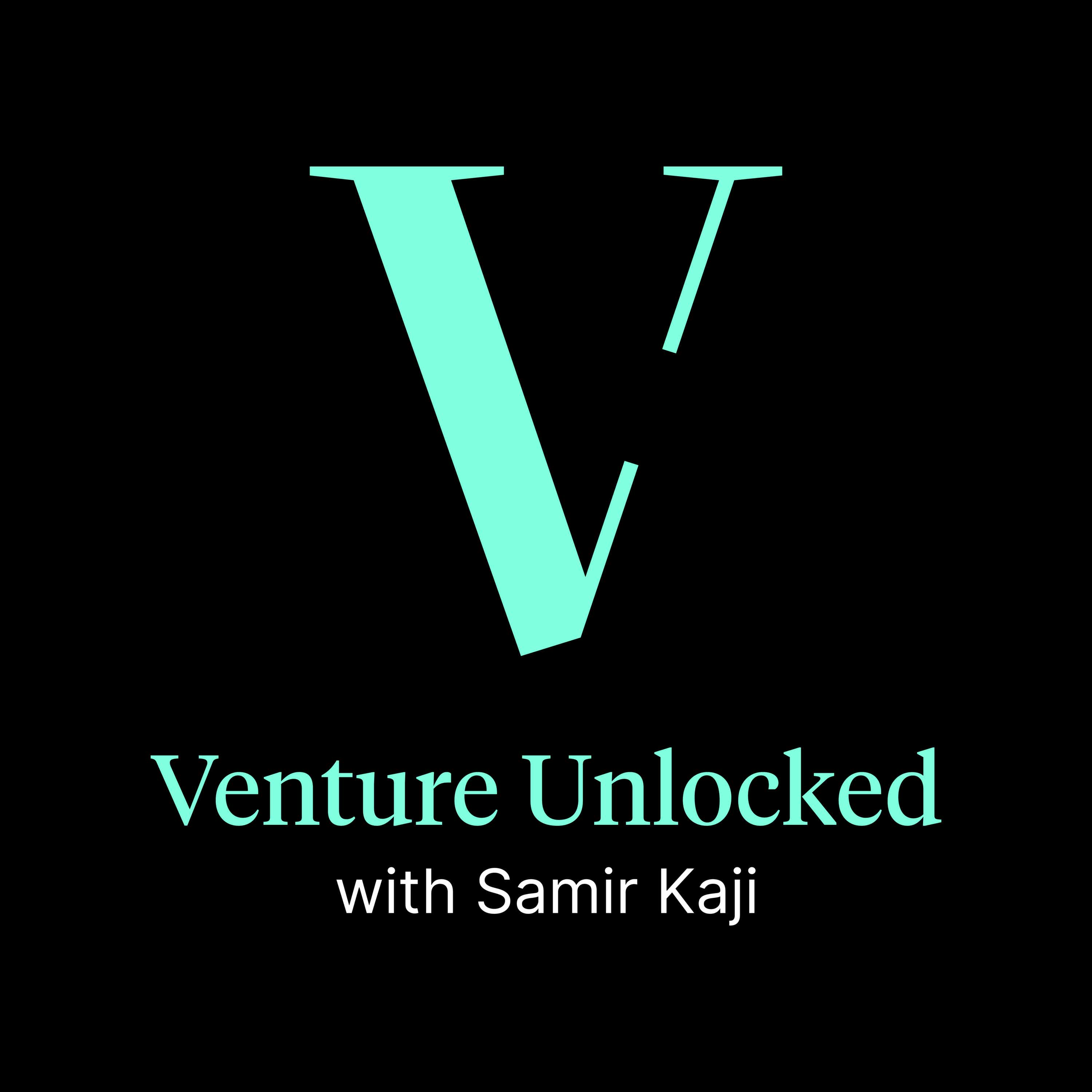All Summaries for Venture Unlocked: The playbook for venture capital managers
Venture Unlocked is the playbook for starting, operating, & scaling a successful venture capital firm. Samir Kaji, Host of Venture Unlocked has +20-years of experience assisting & advising startups and venture firms. Listen for VC fund guidance. ventureunlocked.substack.com
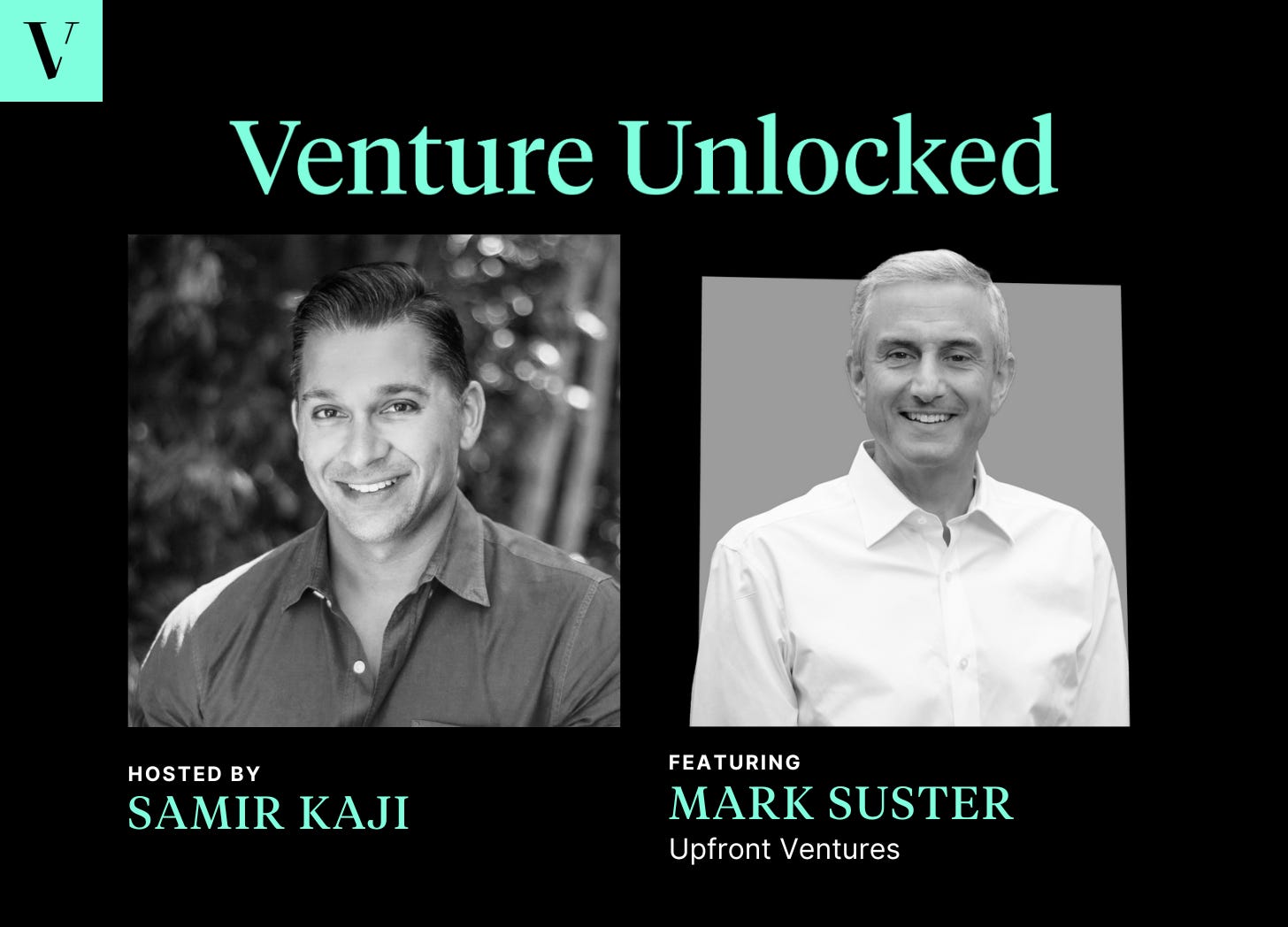
The art of raising from LPs in an economic downturn with Mark Suster, Upfront Ventures
Follow me @samirkaji for my thoughts on the venture market, with a focus on the continued evolution of the VC landscape.Today we’re excited to bring Mark Suster back on the pod. Mark is the managing partner of Upfront and also a frequent contributor of great content for the venture ecosystem through his blog, Both Sides of the Table, which I’d highly recommend you subscribe to. Mark and Samir were recently talking about venture funds raising in this market, and we thought it would be timely to record a session on what we are seeing, and how venture fund managers should think about navigating in this market. About Mark Suster:Mark Suster is a Partner at Upfront. He previously was the Founder and CEO of two successful enterprise software companies, the most recent of which was sold to Salesforce.com where Mark became VP, Products. Prior to being a founder, Mark was a software developer at Accenture where he lived and worked in Europe, Japan and the U.S.Mark is a graduate of UCSD and has an MBA from the University of Chicago.In this episode we discuss:(01:51) With fundraising down from its high in 2021, what are GPs and LPs saying about the market(04:33) What institutional investors are saying about the market(09:19) How emerging managers can access larger global pools of capital(13:47) Building a sales pipeline for your fundraising process as an emerging manager(18:03) Moving deals through the mid-funnel death trap(21:55) Non-obvious things managers can do to improve their fundraising(25:29) Strategies to talk to Family Offices versus large institutional investors(30:49) How to stand out as a manager in a crowded field(34:17) Preparing for an LP meeting(38:45) The bull case for venture moving forward(41:44) How are LPs thinking about venture as an asset category and about the liquidity premiums across the entire market(45:49) Putting in the work to find good managers versus investing in a larger brand name fund(47:30) The importance of having a reserve as an emerging managerI’d love to know what you took away from this conversation with Mark. Follow me @SamirKaji and give me your insights and questions with the hashtag #ventureunlocked. If you’d like to be considered as a guest or have someone you’d like to hear from (GP or LP), drop me a direct message on Twitter.Podcast Production support provided by Agent Bee This is a public episode. If you would like to discuss this with other subscribers or get access to bonus episodes, visit ventureunlocked.substack.com
Wed, August 30, 2023
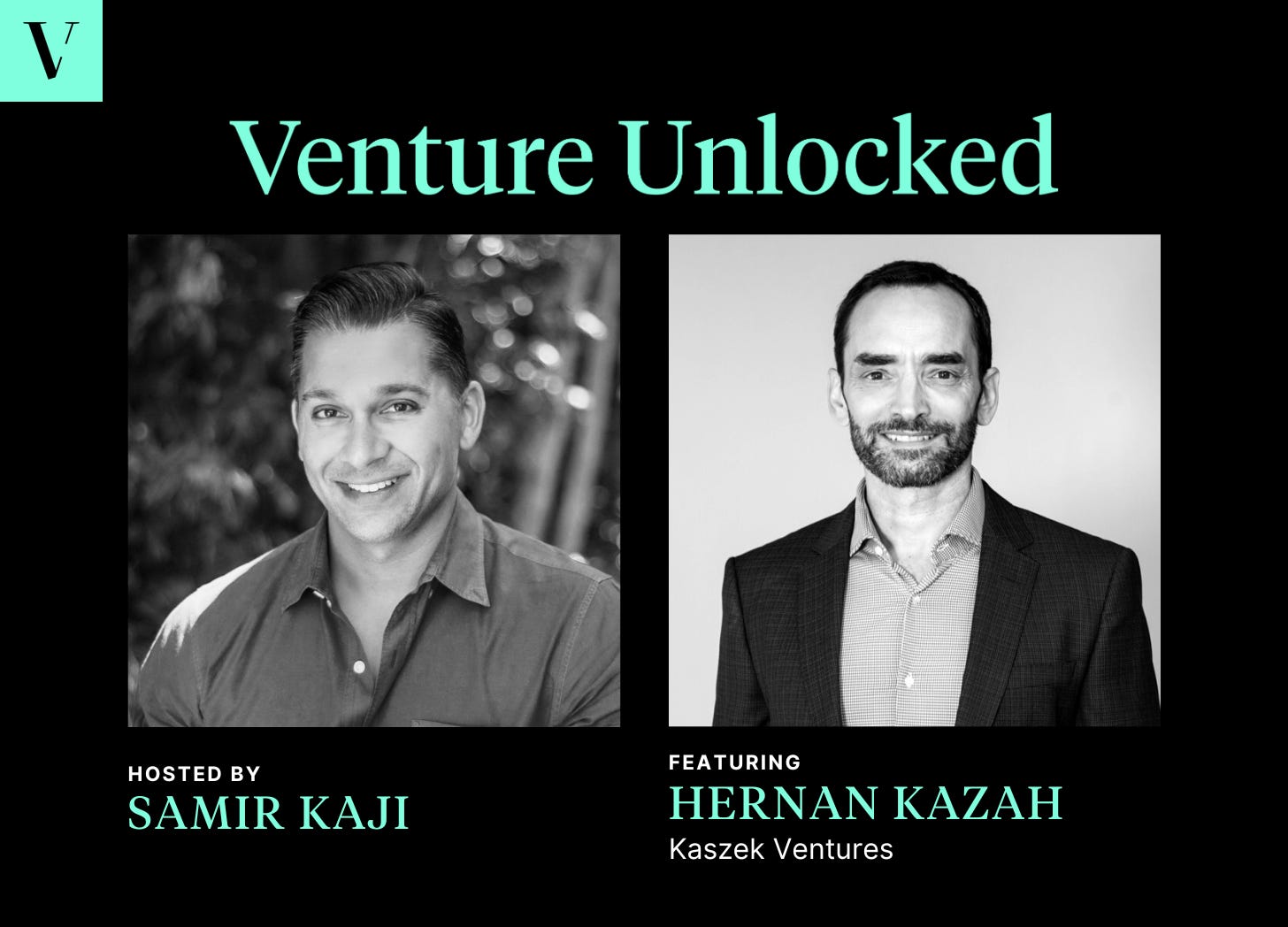
Hernan Kazah of Kaszek Ventures on investing in Latin America, learnings from building a public company, and working with founders
Follow me @samirkaji for my thoughts on the venture market, with a focus on the continued evolution of the VC landscape.On this week’s show, we’re excited to have Hernan Kazah, Co-Founder and Managing Partner of Kaszek, one of the largest Latin American firms with nine funds under management. The firm launched in 2011 and over time they’ve made early-stage investments in companies such as Nubank, QuintoAndar, Kavak, Creditas, and Nuvemshop.Before becoming an investor, Hernan Co-Founded MercadoLibre in 1999, an online auction and e-commerce platform that later went public in 2008. At a market cap today of over $60B, the company represents one of the great entrepreneurial successes in the region. During our conversation, we spoke about the growth of Latin America, making the shift from a company builder to a full-time investor, and how founders and investors should think about the capital-scarce market we are navigating today.A word from our sponsor:Privately owned and headquartered in New York City, Grasshopper Bank is built to serve the business and innovation economy. As a client-first digital bank, Grasshopper combines the best of banking technology and years of industry expertise to deliver best-in-class experiences with trusted security and unparalleled support. Grasshopper's digital solutions are tailored for venture capital and private equity firms, startups and small businesses, fintech-focused Banking-as-a-Service (BaaS) and commercial API banking platforms, and more. Serving clients globally, Grasshopper provides flexible, firm-focused lending solutions, as well as a dedicated Relationship Manager committed to meeting the unique needs and strategic focus of your firm across all entities, including funds, general partner and management companies. Grasshopper is a member of the FDIC and an Equal Housing Lender.For more information, visit the bank's website at www.grasshopper.bank or follow on LinkedIn and X.About Hernan Kazah:Hernan Kazah is the Co-Founder and Managing Partner of Kaszek Ventures. Hernan has overseen Kaszek’s growth into the largest venture capital firm in Latin America. It has invested in more than 100 startups and is known for its ability to spot the next tech talent and hands-on approach.Prior to investing, Hernan Co-Founded MercadoLibre, the most successful "from-garage-to-Nasdaq" startup story in Latin America to date, and one of the largest technology companies in the region.He has a BA from the University of Buenos Aires and an MBA from Stanford.In this episode we discuss:(02:57) Hernan’s journey into tech and investing(04:39) Lessons from MercoadoLibre that he wanted to apply in building Kaszek(10:38) Why he decided to move to venture in 2011(14:11) The long process of building an LP base with an unproven theory(20:21) Advice and mentorship Hernan sought out prior to starting Kaszek(24:56) How Hernan manages his time to help his portfolio(28:57) Comparing the market of 1999/2000 with today’s market(36:04) What it means to support founders(42:33) Why Hernan is mostly handsoff in his portfolio companies(46:50) How to have tough conversations with founders(48:10) The best career advice he’s recievedI’d love to know what you took away from this conversation with Hernan. Follow me @SamirKaji and give me your insights and questions with the hashtag #ventureunlocked. If you’d like to be considered as a guest or have someone you’d like to hear from (GP or LP), drop me a direct message on Twitter.Podcast Production support provided by Agent Bee This is a public episode. If you would like to discuss this with other subscribers or get access to bonus episodes, visit ventureunlocked.substack.com
Wed, August 16, 2023

Tomasz Tunguz of Theory Ventures on strategically raising a fund in a downturn, Why Firms Need a Business Model, and different views on portfolio construction
Follow me @samirkaji for my thoughts on the venture market, with a focus on the continued evolution of the VC landscape.On this week’s show we’re excited to have Tomasz Tunguz, Founder of newly formed Theory Ventures. Tomasz spent nearly 15 years at Redpoint Ventures, before recently spinning out to start Theory Ventures. Earlier this year, Theory closed a $230MM fund to back early stage entrepreneurs. Those who have followed Tomasz’s writing, know that he is incredibly analytical and thoughtful in his approach to business. This conversation was no different as we went deep into topics such as portfolio construction theory, business models in VC, and how to be strategic in raising a VC fund. About Tomas Tunguz:Tomasz Tunguz is a Founder and Managing Director at Theory Ventures. He is an active blogger at tomtunguz.com and is co-author of Winning with Data which explores the cultural changes big data brings to business and shows you how to adapt your organization to leverage data to maximum effect.Before founding Theory, Tomasz was Managing Director at Redpoint Ventures, where he backed many early-stage SaaS, data, and infrastructure founders in his 14-year tenure. He began his career as the product manager for Google’s AdSense social-media products and AdSense internationalization.Tomasz attended Dartmouth College and graduated with a BA in mechanical engineering, a BE in machine learning, and a master’s degree in engineering management.In this episode we discuss:(01:42) Why Tomasz joined Redpoint(03:01) The decision to start Theory Ventures (06:32) Raising his first fund during one of the most difficult raise environments in recent history(07:45) What his plan was with the raise(10:47) How Tomasz created and sustained momentum during his raise(16:12) Common objections from LPs and how he overcame them(19:49) What it means for a venture firm to have a business model(23:00) How Theory’s thesis addresses the problem of multiples in the venture market(24:59) Winning deals without paying premiums(26:13) Why the 3x net returns on venture needs to increase to be competitive(27:40) Getting comfortable with a smaller portfolio(31:29) Tomasz’s mental model of picking and diligence with a smaller portfolio(34:30) Qualitative signs he looks for in founders and companies(38:19) Why Tomasz embraces the emerging manager label(39:30) What the next decade of venture looks like(42:07) The best career advice he’s receivedI’d love to know what you took away from this conversation with Tomasz. Follow me @SamirKaji and give me your insights and questions with the hashtag #ventureunlocked. If you’d like to be considered as a guest or have someone you’d like to hear from (GP or LP), drop me a direct message on Twitter.Podcast Production support provided by Agent Bee This is a public episode. If you would like to discuss this with other subscribers or get access to bonus episodes, visit ventureunlocked.substack.com
Wed, July 26, 2023
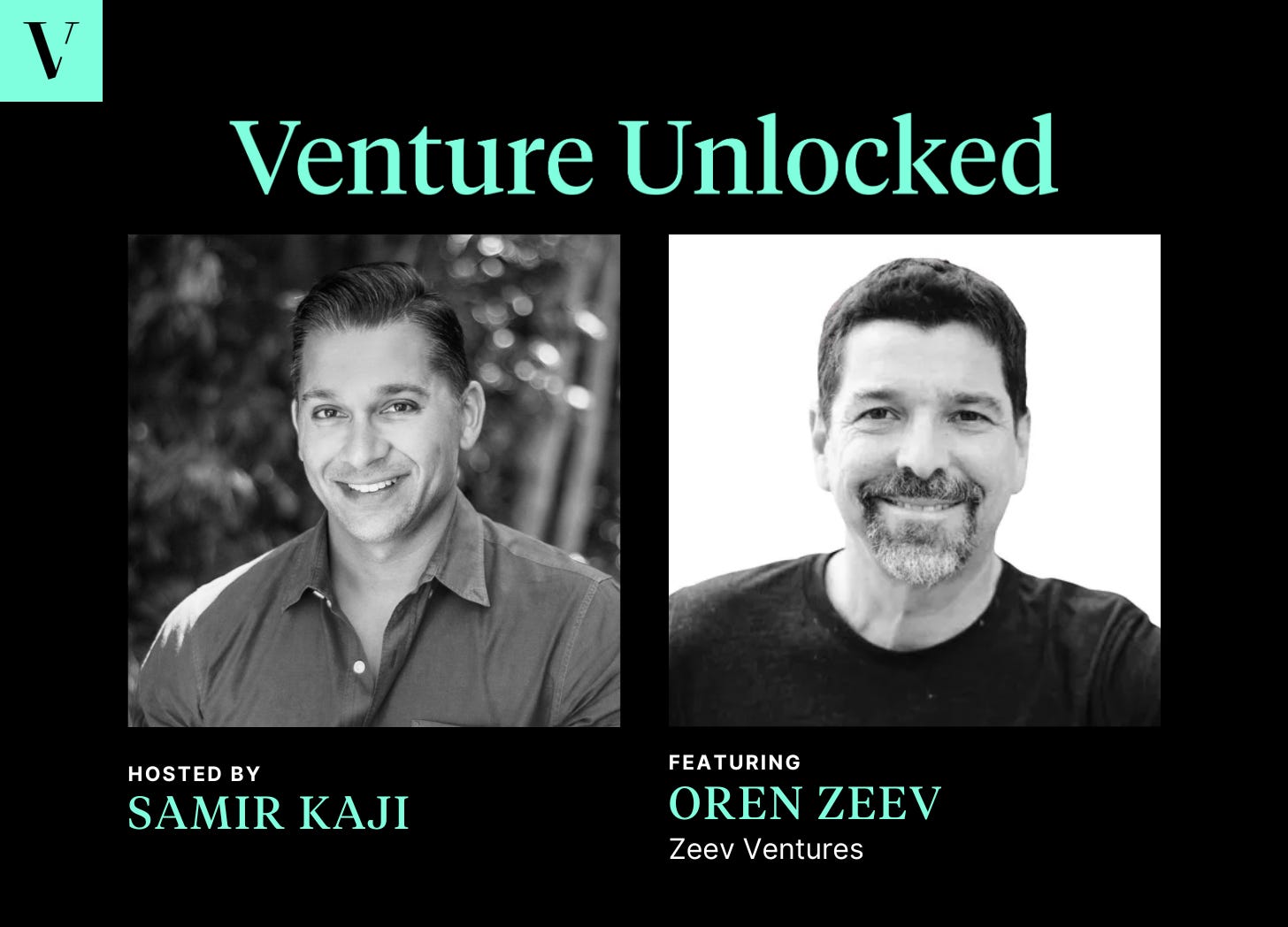
Oren Zeev on scaling to $2B+ in AUM as a solo-GP, contrarian investing, and high founder NPS
Follow me @samirkaji for my thoughts on the venture market, with a focus on the continued evolution of the VC landscape.We’re pleased to welcome Oren Zeev, Founding Partner at Zeev Ventures. Without a doubt, Oren is one of the titans in venture investing with nearly 30 years of experience and one of the most unique. Unlike traditional firms that have achieved scale, Oren remains a solo-GP, and has an authentic and refreshing view on venture investing. Today, he manages over $2B in Assets under management and has backed companies such as Houzz, Audible, Chegg, TripActions, and Tipalti, among many others.About Oren Zeev: Oren calls himself a “One Man Venture Capitalist,” and TechCrunch says he is a hybrid between an Angel Investor and a traditional VC. Prior to founding Zeev Ventures, Oren was a part of the founding team of Apax Israel in 1995. In 2002 moved to the US and co-headed, and later headed, the Technology Practice of Apax and the Silicon Valley office.He began his career at IBM and got his Bachelors from the Israel Institute of Technology and his MBA from INSEAD.In this episode we discuss:(02:21) The original thesis behind Zeev Ventures(09:44) Why Oren has avoided growing beyond a solo-GP(15:05) How Oren pushes himself to prevent biases and evolve his thinking over time(18:50) Why fund vintage doesn’t matter(21:24) The reason why Oren can be aggressive with follow-ons(23:59) What type of support can founders expect(27:50) Being relevant to founders as a VC(30:26) Working with other VCs on board(32:47) Advice to companies that had 2021 valuations that may need to raise soon(37:03) Thoughts on this downturn(41:47) Why Venture is still a good long-term investmentI’d love to know what you took away from this conversation with Oren. Follow me @SamirKaji and give me your insights and questions with the hashtag #ventureunlocked. If you’d like to be considered as a guest or have someone you’d like to hear from (GP or LP), drop me a direct message on Twitter.Podcast Production support provided by Agent Bee This is a public episode. If you would like to discuss this with other subscribers or get access to bonus episodes, visit ventureunlocked.substack.com
Wed, June 14, 2023

Stephanie Palmeri and Melody Koh of NextView Ventures on incentives within venture partnerships, the changes in seed financing, and operating remotely
Follow me @samirkaji for my thoughts on the venture market, with a focus on the continued evolution of the VC landscape.We’re joined by Stephanie Palmeri and Melody Koh, Partners at NextView Ventures. Nextview was founded in 2010 and recently raised $200MM for their new set of funds. Located in SF, NY, and Boston, the firm invests all across the US and has invested in over 170 companies at the seed-stage since its founding, including Devoted Health, Thread up, and Attentive. We had a great conversation about how NextView thinks about firm partnerships, what seed and pre-seed investing look like today, and what they believe it means to successfully work with founders. About Stephanie Palmeri:Stephanie is a Partner at NextView Ventures and is based in San Francisco. She focuses on the power of technology to positively transform how we live, work, learn, play, and care for our planet and each other. Her investments in the “Everyday Economy” have spanned many industries, including social commerce, circular retail, education, digital health, marketplaces, transportation, and finance. Previously, Stephanie was a partner at Uncork Capital, where she spent a decade investing in dozens of seed stage companies, including Poshmark ($POSH), Clever (aqu. by Kahoot!), Chariot (acq. by Ford), ClassDojo, Carrot Fertility, Hallow, Panorama Education, Phil, Wrapbook, and Wonderschool. Before venture investing, Stephanie worked as a technology consultant and marketer at Accenture, Estee Lauder, and several startups.Stephanie holds an MBA from Columbia Business School and a BS in Marketing and Management Information Systems, magna cum laude, from Villanova University.About Melody Koh:Melody is a Partner at NextView Ventures, based in its New York office. Prior to joining NextView, Melody was Head of Product at Blue Apron (NYSE: APRN). Melody joined Blue Apron as the first product hire when the company was 18 months old with 20 HQ employees. She helped scale the business through hyper-growth (25x in 3.5 years) and to its IPO.Previously, Melody was a Product Manager at Fab.com leading marketing & analytics products and the founder/CEO of a seed-funded wine subscription e-commerce service. Melody was also a venture investor at Time Warner’s strategic VC group and was one of six inaugural members of First Round Capital’s Product Co-op initiative. Melody began her career as a tech/media M&A investment banking analyst at Evercore Partners.Melody holds an MBA from the Harvard Business School and the University of Virginia.In this episode. we discuss:(01:54) Why NextView strives to not be a pack of lone wolves(03:35) How the carry economics of the firm drives a deeper partnership(06:57) Building firm culture with so many locations(11:21) How NextView uses strategic in-person time to remain connected(13:42) The benefits to founders by being more strategic in their investments(16:33) How the NextView model performed in the different market conditions over the last few years(21:04) What the moving goalposts of the market has meant to founders and investors(25:27) The advice they are giving founders to get through this difficult funding cycle(29:18) Why NextView sees themselves as invited guests and why that translates to happy founders(34:31) How they think about the growth and evolution of NextViewI’d love to know what you took away from this conversation with Stephanie and Melody. Follow me @SamirKaji and give me your insights and questions with the hashtag #ventureunlocked. If you’d like to be considered as a guest or have someone you’d like to hear from (GP or LP), drop me a direct message on Twitter.Podcast Production support provided by Agent Bee This is a public episode. If you would like to discuss this with other subscribers or get access to bonus episodes, visit ventureunlocked.substack.com
Fri, June 2, 2023
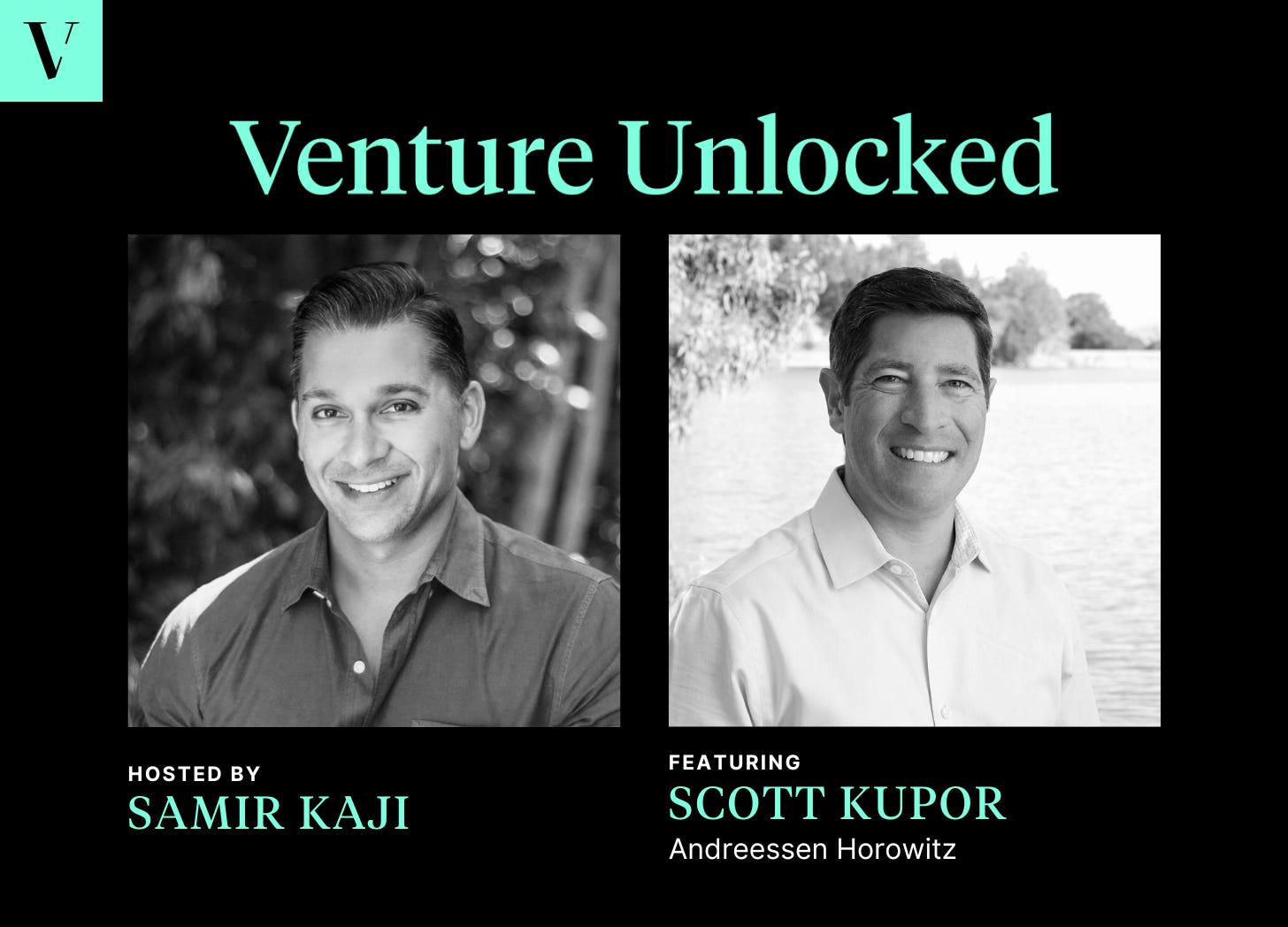
Scott Kupor, Managing Partner of a16z on Building a lasting Venture Franchise
Follow me @samirkaji for my thoughts on the venture market, with a focus on the continued evolution of the VC landscape.This week we’re joined by Scott Kupor, Managing Partner at Andreessen Horowitz. Scott was the first employee of the firm alongside Marc Andreessen and Ben Horowitz. He has been instrumental in the firm’s growth to now having north of $35B in AUM. Scott also authored a Wall Street Journal bestselling book called Secrets of Sand Hill Road: Venture Capital and How to Get It, and previously also served as chairman of the board of the NVCA. Scott goes through the history of a16z and the learnings along the way in building the multi-product investment company it is today.Frank, Rimerman + Co.’s history is closely intertwined with that of Silicon Valley. With humble beginnings similar to so many start-ups, Frank, Rimerman was formed with a desire to serve the entrepreneurial and venture communities of the Valley and the determination to think outside-the-box.When it comes to venture funds, we work with almost 500 VC groups from over 20 states across the USA. We have worked with over 400 fund groups during their first year of operations, making us one of the leading providers in the country to emerging managers.No one wants to be bored at work. That’s why we chose to work with some of the most innovative and creative people – people who are changing the world around us every day. Their excitement fuels our passion and determination to grow and serve this special community.Frank, Rimerman + Co, Passion Works Here.www.frankrimerman.comAbout Scott Kupor:Scott Kupor is Managing Partner at Andreessen Horowitz, focused on growth-stage companies building in the bio and healthcare industries, manages the firm's investor relations team, and is responsible for the firm's growth initiatives. Scott was the first employee at Andreessen Horowitz and managed the firm's growth from $300 million in AUM to more than $30 billion. Prior to joining the firm, Scott worked Hewlett Packard, Opsware, and represented startups through M&A processes. Scott is the author of the Wall Street Journal bestselling book, Secrets of Sand Hill Road: Venture Capital and How to Get It, and serves on the boards of Cedar, Headway, Foursquare, Labster, Ultima, and SnapLogic. He also served as chairman of the board for the National Venture Capital Association.Scott earned a bachelor’s degree and a JD from Stanford University.In this episode, we discuss:(02:24) Scott’s journey to a16z(04:52) Lessons from the dotcom bubble (08:29) Why the original thesis for a16z was so different(12:33) How Mike Ovitz and CAA inspired them(16:44) Early days building the firm and recruiting the team(20:26) Running the firm like a startup(25:58) Challenges of building and maintaining a culture(30:01) Building cohesion with a global workforce and work from home(33:18) What “founder-friendly” means at a16z(36:34) Advice for new managers(40:49) Where we are in the current market cycle(44:59) The advice Scott would give e himself as a new graduate.I’d love to know what you took away from this conversation with Scott. Follow me @SamirKaji and give me your insights and questions with the hashtag #ventureunlocked. If you’d like to be considered as a guest or have someone you’d like to hear from (GP or LP), drop me a direct message on Twitter.Podcast Production support provided by Agent Bee This is a public episode. If you would like to discuss this with other subscribers or get access to bonus episodes, visit ventureunlocked.substack.com
Wed, May 17, 2023
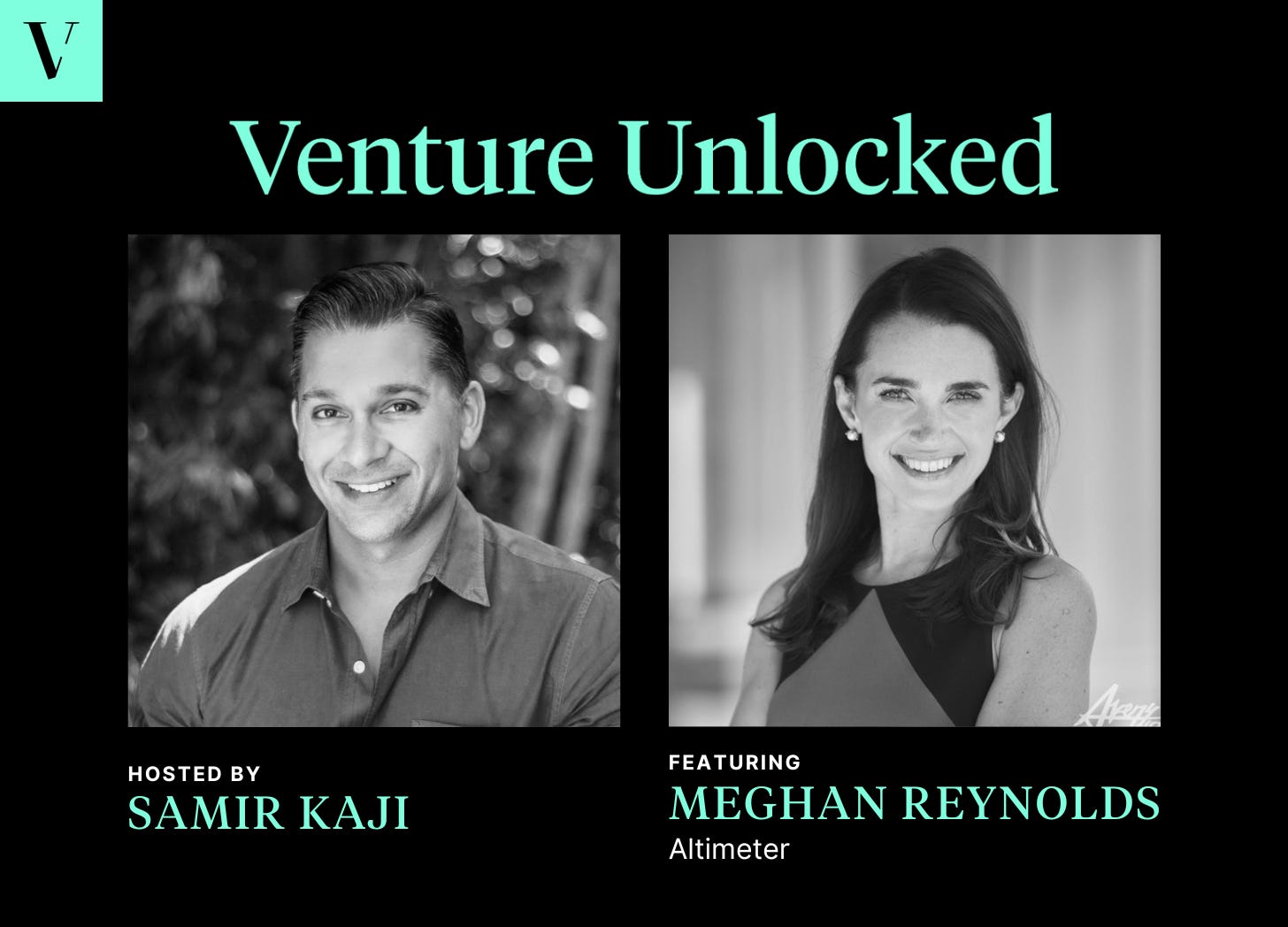
Fundraising best practices for managers, strategic LP management, and LPACs with Meghan Reynolds of Altimeter
Follow me @samirkaji for my thoughts on the venture market, with a focus on the continued evolution of the VC landscape.This week on the show we’re joined by Meghan Reynolds, partner and head of capital formation at Altimeter. Founded by Brad Gerstner in 2008, Altimeter has backed companies such as Snowflake, Unity, Gusto, and Modern Treasury. Prior to joining Altimer, Meghan worked in a variety of investor relations roles including TPG, Goldman Sachs, and JAZZ Ventures partners.She’s also quite prolific on Twitter with her insights on the LP world. This conversation was great as she went through the system she uses to form and maintain relationships with world-class LPs.A word from our sponsor:Venture capital firms and their investors have realized that a fund administrator without best-in-class technology is no longer acceptable. But experienced firms also know that when it’s crunch time and that capital call needs to go out now, no technology can replace the need for an expert, highly responsive fund accountant working with you. It’s time you talk with Juniper Square: the first technology-driven fund admin built for sophisticated venture capital firms. Learn more and request a call todayAbout Meghan Reynolds:Meghan is the Head of VC Capital Formation and Fundraising for Altimeter, a lifecycle technology investment firm. Prior to joining Altimeter, Meghan was Managing Partner and Co-head of Fundraising at TPG. She began her career and spent nearly a decade in the Investment Management Division of Goldman Sachs. ShMeghan is also currently a Venture Partner with JAZZ Venture Partners, an early stage Venture firm focused on the intersection of technology and human performance.Meghan graduated from the University of Notre Dame.In this episode we discuss:(02:42) Meghan’s career path that led her to Altimeter(05:40) How Meghan defines capital formation(10:33) Making decisions that allow the investment team to thrive while balancing LP interests(14:03) Building the right frameworks with LPs who may ultimately become long-term partners(17:03) Ways managers can differentiate outside of returns(19:44) Other factors that go into LP relationship management(23:16) The importance of transparency with your LPs(26:01) How LPs are reacting to current market trends(29:17) Using an LP Advisory Committee strategically(35:00) International sources of institutional capital(40:14) Fundraising advice for solo GPs(43:32) What to look for when hiring for a capital formation role(47:16) Predicting the market over the next 5 to 10 yearsI’d love to know what you took away from this conversation with Meghan. Follow me @SamirKaji and give me your insights and questions with the hashtag #ventureunlocked. If you’d like to be considered as a guest or have someone you’d like to hear from (GP or LP), drop me a direct message on Twitter.Podcast Production support provided by Agent Bee This is a public episode. If you would like to discuss this with other subscribers or get access to bonus episodes, visit ventureunlocked.substack.com
Wed, April 26, 2023
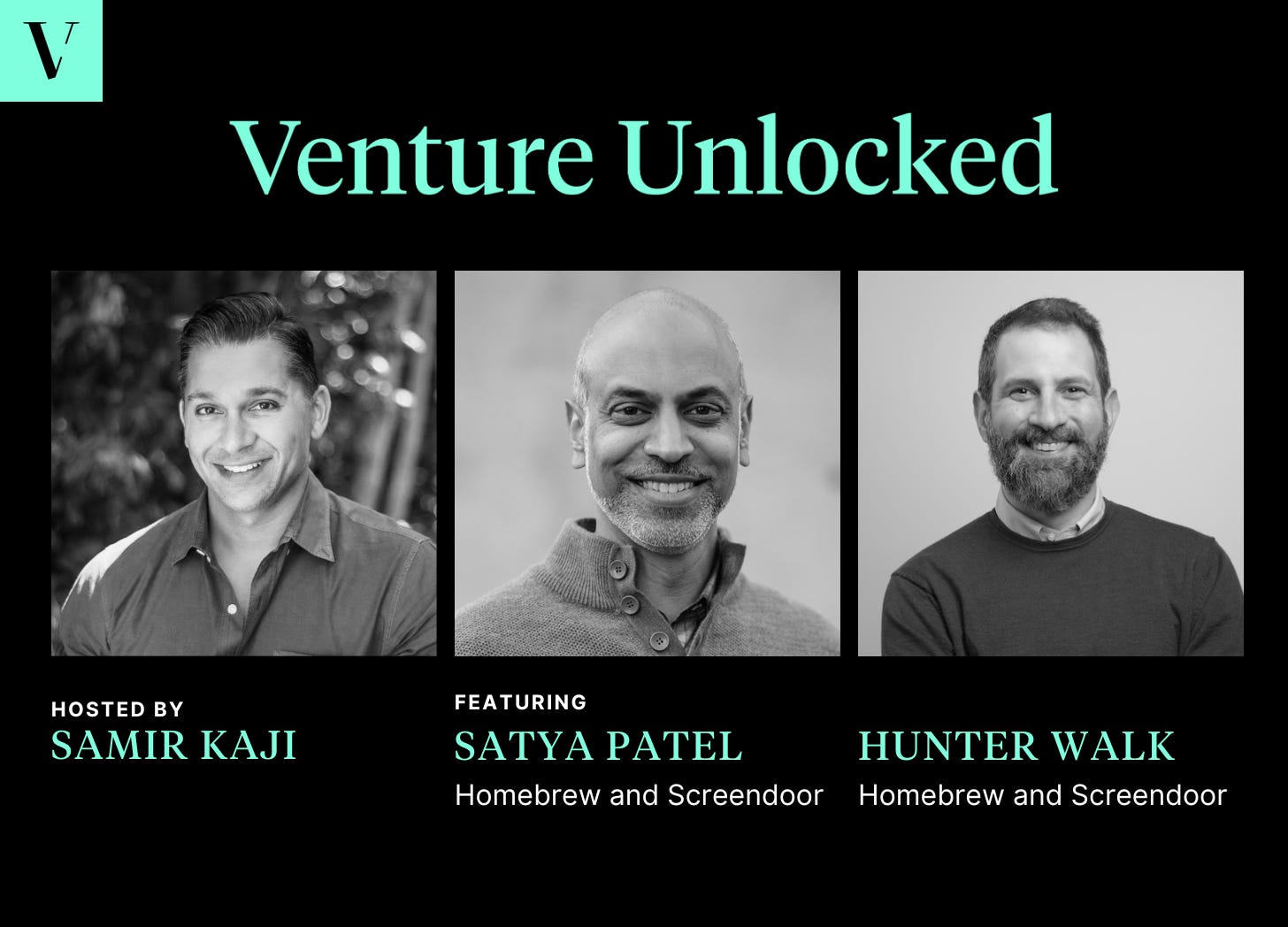
Satya Patel and Hunter Walk on learnings from building Homebrew, moving to an evergreen model, and launching Screendoor VC to back underrepresented fund managers
Follow me @samirkaji for my thoughts on the venture market, with a focus on the continued evolution of the VC landscape.On this week’s show we’re fortunate to be joined by Hunter Walk and Satya Patel, founders of Homebrew, a seed-stage firm founded over a decade ago that’s backed companies such as Chime, AngelList, and Gusto. Just over a year ago, Homebrew announced that it was moving away from a seed-focused traditional LP-backed fund to an open-ended evergreen structure that is funded from the proceeds of prior investments.Additionally, they are also leading up efforts of Screendoor, a fund of funds focused on supporting underrepresented fund managers by offering capital and counsel. Satya is coming back on the show for the second time, and it was fun to have Hunter on with him this time, as we dove deep into their learnings from building homebrew, what they look for when back fund managers, and their view on what makes a great partner for founders. This was a fun one, and we think you’ll really enjoy hearing their thoughts. Let’s now get right into it!A word from our sponsor:Privately owned and headquartered in New York City, Grasshopper Bank is built to serve the business and innovation economy. As a client-first digital bank, Grasshopper combines the best of banking technology and years of industry expertise to deliver best-in-class experiences with trusted security and unparalleled support. Grasshopper's digital solutions are tailored for venture capital and private equity firms, startups and small businesses, fintech-focused Banking-as-a-Service (BaaS) and commercial API banking platforms, and more. Serving clients globally, Grasshopper provides flexible, firm-focused lending solutions, as well as a dedicated Relationship Manager committed to meeting the unique needs and strategic focus of your firm across all entities, including funds, general partner and management companies. Grasshopper is a member of the FDIC and an Equal Housing Lender.For more information, visit the bank's website at www.grasshopper.bank or follow on LinkedIn and Twitter.About Satya Patel:Satya Patel is a Founding Partner of Homebrew and Co-Founder of Screendoor. Prior to Homebrew, he was VP Product at Twitter, building and leading the Product Management and User Services teams. Before Twitter, he was a Partner at Battery Ventures, where he co-led the seed and early-stage investing practices. He joined Google in 2003 and was responsible for AdSense product management and partnerships.Before heading to Silicon Valley for Google, he worked for DoubleClick, in venture capital, and as a strategy consultant.He has a BS in Finance and a BS in Psychology from The University of Pennsylvania.About Hunter Walk:Hunter Walk is a Founding Partner of Homebrew and Co-Founder of Screendoor. Prior to Homebrew, Hunter led consumer product management at YouTube, starting when it was acquired by Google. He originally joined Google in 2003, managing product and sales efforts for AdSense, Google‘s contextual advertising business.His first job in Silicon Valley was as the founding product and marketing guy at Linden Lab.Before graduate school, he was a management consultant and also spent a year at Late Night with Conan O‘Brien. He has a BA in History from Vassar and MBA from Stanford University.In this episode we discuss:(03:32) The decision to move to an evergreen fund structure with Homebrew(07:32) The biggest constraints when early-stage fund sizes balloon(17:34) How to survive a down market and become a force multiplier on a cap table(24:58) The inspiration to start Screendoor(33:33) The type of managers they are looking to back at Screendoor(37:54) Patterns they’ve seen in great investors(42:13) The most important question they ask GPs(44:42) The biggest lessons from their time as investorsI’d love to know what you took away from this conversation with Satya and Hunter. Follow me @SamirKaji and give me your insights and questions with the hashtag #ventureunlocked. If you’d like to be considered as a guest or have someone you’d like to hear from (GP or LP), drop me a direct message on Twitter.Podcast Production support provided by Agent Bee This is a public episode. If you would like to discuss this with other subscribers or get access to bonus episodes, visit ventureunlocked.substack.com
Wed, April 12, 2023
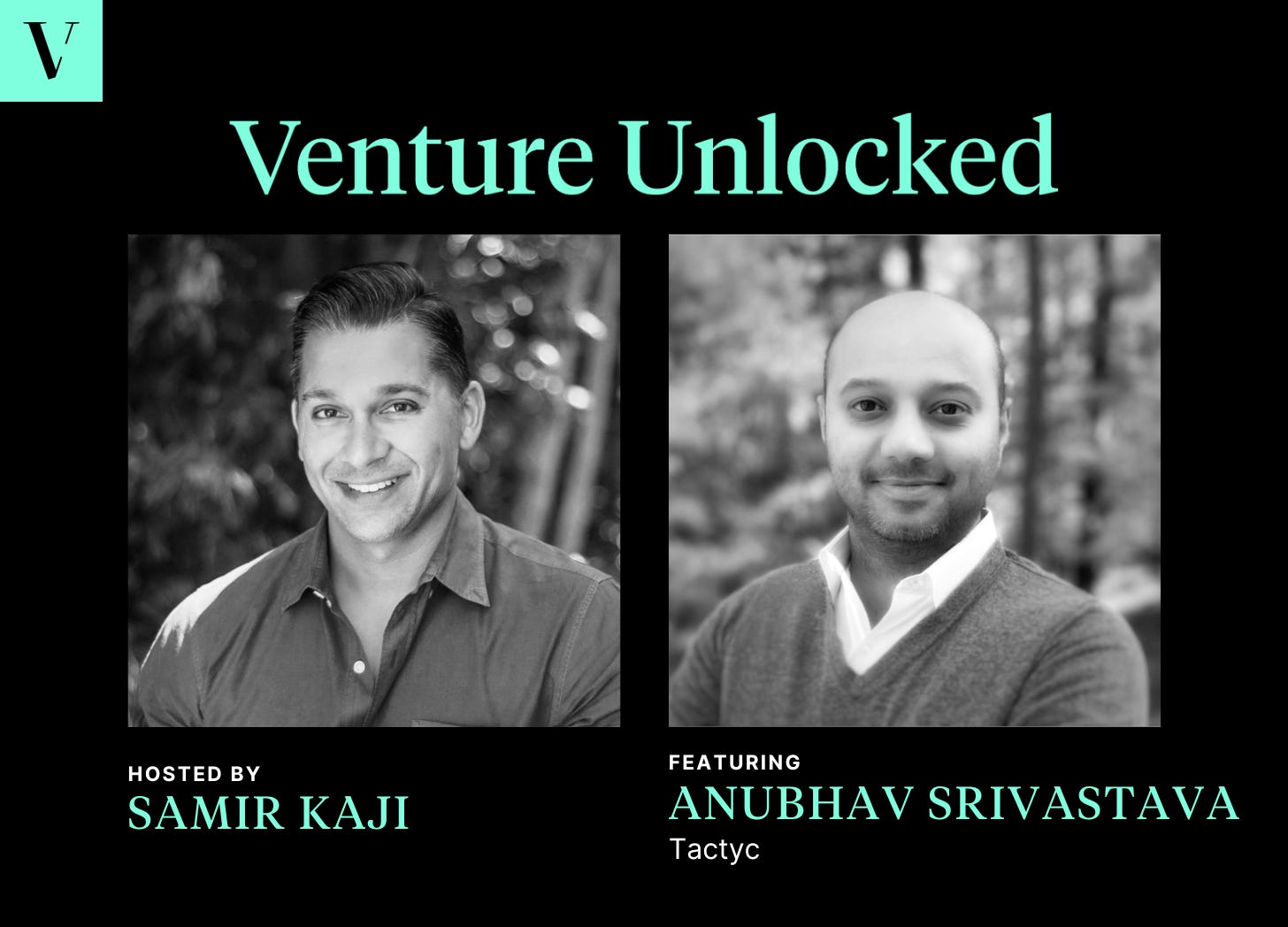
Portfolio construction trends and best practices with CEO Anubhav Srivastava of Tactyc
Follow me @samirkaji for my thoughts on the venture market, with a focus on the continued evolution of the VC landscape. I started Venture Unlocked to bring more transparency to firm building by bringing on guests whose unique insights and experts could help venture fund managers, limited partners, and founders with their journeys. This week, we have a special guest in Anubhav Srivastava, Founder and CEO of Tactyc, who saw the pain point managers were having in portfolio construction. Prior to Tactyc, managers often used excel spreadsheets and other methods for forecasting models. Tactyc is a dynamic software dashboard that makes ongoing portfolio modeling easy. Anyone who has listened to this show knows that portfolio construction is one of my favorite things to talk about, and Anubhav provided his data-driven insights on what he’s seeing on how emerging managers are modeling portfolios around number of companies, reserves, recycling, and follow-ons.Here is a completed dashboard that shows the Tactyc platform in action. You can also schedule a 1-on-1 demo with Anubhav, Tactyc's founder directly here. We hope you enjoy my conversation with Anubhav.A word from our sponsor:Privately owned and headquartered in New York City, Grasshopper Bank is built to serve the business and innovation economy. As a client-first digital bank, Grasshopper combines the best of banking technology and years of industry expertise to deliver best-in-class experiences with trusted security and unparalleled support. Grasshopper's digital solutions are tailored for venture capital and private equity firms, startups and small businesses, fintech-focused Banking-as-a-Service (BaaS) and commercial API banking platforms, and more. Serving clients globally, Grasshopper provides flexible, firm-focused lending solutions, as well as a dedicated Relationship Manager committed to meeting the unique needs and strategic focus of your firm across all entities, including funds, general partner and management companies. Grasshopper is a member of the FDIC and an Equal Housing Lender.For more information, visit the bank's website at www.grasshopper.bank or follow on LinkedIn and Twitter.About Anubhav Srivastava:Anubhav Srivastava is the Founder and CEO of Tactyc. He is a former bulge-bracket investment banker with extensive experience in M&A and financing transactions. Having spent more time than is healthy with Excel models, the idea for Tactyc was born out of his observations of how he saw people using (and misusing) Excel-based models.Prior to Tactyc, Anubhav was a Vice President at Evolution Media Capital and started his investment banking career at Deutsche Bank.Anubhav has an MBA in Finance from the Wharton School of Business and a B.S. in Electrical Engineering from Georgia Institute of Technology.In this episode we discuss:(02:26) Why Anubhav started Tactyc and what it does(05:10) The reason why using Excel becomes a pain point over time(08:10) How deeper portfolio analysis can give LPs peace of mind(10:55) Who has been more successful in raising over the last year(14:09) Trends of portfolio models in terms of initial valuation at the pre-seed, seed level today versus 2021(16:04) Changes in check sizes and dilution in recent months(18:04) How reserves and follow-ons have changed(19:36) The most important metric for a sub-$50 million fund(21:32) Portfolio strategies for nano-funds(23:32) How successful managers take emotions out of the equation in follow-on investments(26:46) What managers are seeing with follow-on MOIC hurdles(28:59) Why some managers are over-reporting to LPs to navigate this downturn(31:22) The biggest mistakes managers make in portfolio construction reporting(34:57) Understanding the difference between a management fee recycling and exit proceed recycling(36:53) Example of management fee recycling(39:08) What success for Tactyc looks like over the next 5-10 yearsI’d love to know what you took away from this conversation with Anubhav. Follow me @SamirKaji and give me your insights and questions with the hashtag #ventureunlocked. If you’d like to be considered as a guest or have someone you’d like to hear from (GP or LP), drop me a direct message on Twitter.Podcast Production support provided by Agent Bee This is a public episode. If you would like to discuss this with other subscribers or get access to bonus episodes, visit ventureunlocked.substack.com
Fri, April 7, 2023
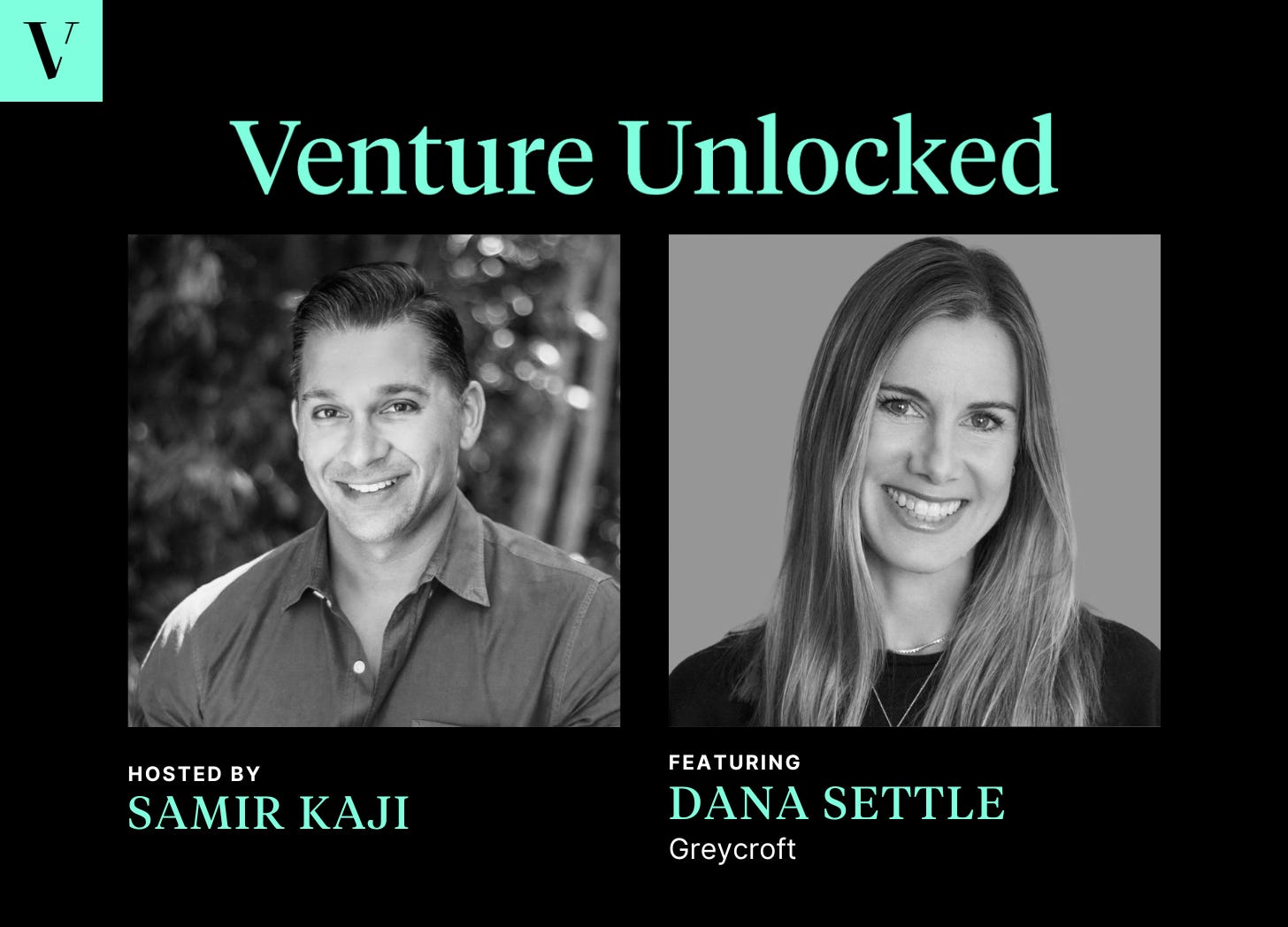
Dana Settle on starting and building Greycroft, Maintaining culture and speed with scale, and thoughts on VC moving forward
Follow me @samirkaji for my thoughts on the venture market, with a focus on the continued evolution of the VC landscape.This week on the show we’re joined by Dana Settle, Co-Founder of Greycroft. Founded in 2006, Greycroft began with a mission to invest in areas outside of Silicon Valley and specifically in NY and LA. The firm currently has over $2B in Assets Under Management, over 60 employees, and has invested in companies such as Bumble, Scopely, Plated, and Maker Studios among many others. This was a special episode where we unpacked all of the components of firm-building including team development, fundraising, investment decision-making, and evolving to market dynamics. We hope you enjoy my conversation with Dana.Program note: This was recorded prior to the issues arising in the banking sector.A word from our sponsor:Privately owned and headquartered in New York City, Grasshopper Bank is built to serve the business and innovation economy. As a client-first digital bank, Grasshopper combines the best of banking technology and years of industry expertise to deliver best-in-class experiences with trusted security and unparalleled support. Grasshopper's digital solutions are tailored for venture capital and private equity firms, startups and small businesses, fintech-focused Banking-as-a-Service (BaaS) and commercial API banking platforms, and more. Serving clients globally, Grasshopper provides flexible, firm-focused lending solutions, as well as a dedicated Relationship Manager committed to meeting the unique needs and strategic focus of your firm across all entities, including funds, general partner and management companies. Grasshopper is a member of the FDIC and an Equal Housing Lender.For more information, visit the bank's website at www.grasshopper.bank or follow on LinkedIn and Twitter.About Dana Settle:Dana Settle is a Co-Founder and Managing Partner at Greycroft. Dana’s active investments include Acorns, Anine Bing, Avaline, Bird, Citizen, Cloud Paper, data.ai, Goop, HamsaPay, Happiest Baby, Merit Beauty, Mountain Digital, Pacaso, Seed Health, Tapcart, Thrive Market and Versed. Her notable exits include Bumble (IPO), Maker Studios (acquired by Disney), Pulse (acquired by LinkedIn), The RealReal (IPO), Trunk Club (acquired by Nordstrom), and WideOrbit (interest sold to company management).Prior to Greycroft, Dana spent several years as a venture capitalist and advisor to startups in the Bay Area, including six years at Mayfield, and investment banking at Lehman Brothers.Dana holds a BA in Finance and International Studies from the University of Washington and an MBA from Harvard Business School.In this episode we discuss:(02:03) What led to the creation of Greycroft(06:46) How they found believers in their hypothesis and got their first fundraise completed(08:19) Advice for managers and entrepreneurs raising in the current market(11:34) Building a distributed and remote-first culture outside of Silicon Valley(15:33) The role of diversity when building strong partnerships(19:00) Traits Dana values when she is hiring for the firm(21:09) Why curiosity is so important and how she uncovers that in candidates(23:55) The importance of creating a safe space for new voices to be heard in a firm(27:59) Why Dana hated the internal politics of old Silicon Valley and wanted to remove that from Greycroft(30:54) The decision to follow-on invest in their portfolio companies(33:11) How Greycroft manages conflicts within the partnership(35:01) The philosophy around team-building within the firm and how that benefits their portfolio companies(37:19) How Greycroft remains nimble with such a large organization(39:26) The bull case for Venture Capital moving forward(42:09) What Greycroft got the most correct and the most wrong in its historyI’d love to know what you took away from this conversation with Dana. Follow me @SamirKaji and give me your insights and questions with the hashtag #ventureunlocked. If you’d like to be considered as a guest or have someone you’d like to hear from (GP or LP), drop me a direct message on Twitter.Podcast Production support provided by Agent Bee This is a public episode. If you would like to discuss this with other subscribers or get access to bonus episodes, visit ventureunlocked.substack.com
Thu, March 30, 2023
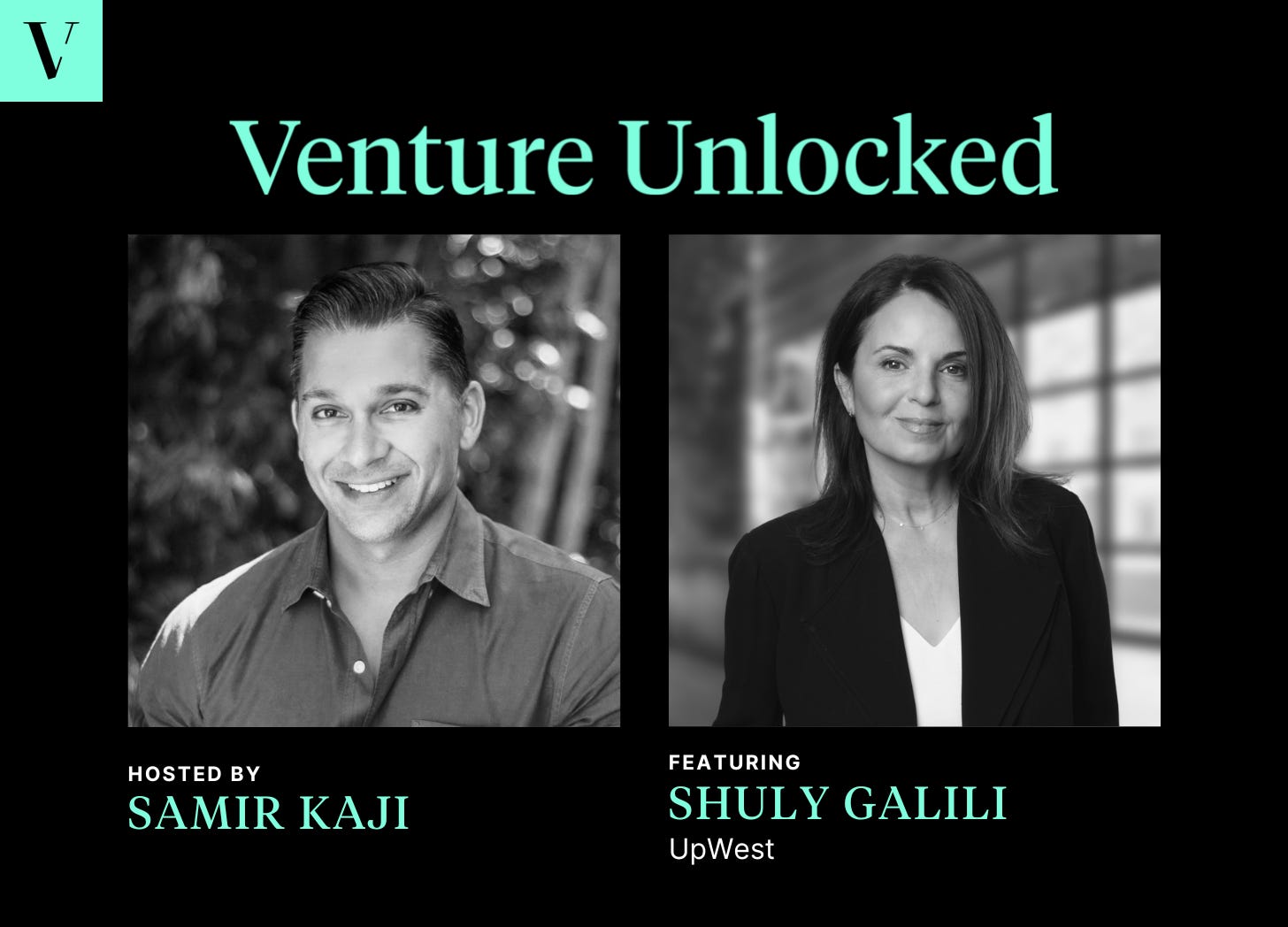
Shuly Galili of UpWest on building lasting partnerships and how they bridged the gap between Israeli founders and the US Market
Follow me @samirkaji for my thoughts on the venture market, with a focus on the continued evolution of the VC landscape.This week we are joined by Shuly Galili, Founding Partner of UpWest, an early-stage firm founded in 2012 with her partner Gil Ben-Artzy to invest in seed-stage founders from Israel that are seeking to expand into the US market. UpWest has 4 funds under management and has invested in nearly 100 companies at the early stage that today have a collective market cap of over $20B. A word from our sponsor:Privately owned and headquartered in New York City, Grasshopper Bank is built to serve the business and innovation economy. As a client-first digital bank, Grasshopper combines the best of banking technology and years of industry expertise to deliver best-in-class experiences with trusted security and unparalleled support. Grasshopper's digital solutions are tailored for venture capital and private equity firms, startups and small businesses, fintech-focused Banking-as-a-Service (BaaS) and commercial API banking platforms, and more. Serving clients globally, Grasshopper provides flexible, firm-focused lending solutions, as well as a dedicated Relationship Manager committed to meeting the unique needs and strategic focus of your firm across all entities, including funds, general partner and management companies. Grasshopper is a member of the FDIC and an Equal Housing Lender.For more information, visit the bank's website at www.grasshopper.bank or follow on LinkedIn and Twitter.About Shuly Galili:Shuly is a Founding Partner at UpWest, a Silicon Valley seed fund investing in startups at the Israel-US technology junction. UpWest portfolio crossed $2B in VC funding and includes companies such as SentinelOne, HoneyBook, Stampli, CyCognito, Imubit, and more.She helped found the California Israel Chamber of Commerce (CICC), a business platform for ongoing tech exchange serving a network of over 10,000 companies. Under Shuly’s leadership as Executive Director, CICC had a significant impact on its members’ success in securing millions in venture capital, establishing US/Israel offices and R&D Centers and branding Israel’s emerging tech industry in Silicon Valley.In this episode we discuss:(02:23) What gap they saw they wanted to fill in 2012(08:45) How the go to market strategy is different in the US vs. Israel(10:51) What their first fundraise was like with a new strategy(14:03) The strategic support UpWest received from its early LPs(15:39) The realization that they needed to grow to realize their vision(18:10) How Fund II changed their investing strategy and approach(21:50) When do you know it’s time to raise your fund size?(25:42) What early-stage investors should optimize for(30:32) Defining a healthy venture GP partnership(33:57) UpWest’s decision-making process(35:20) How Shuly and Gil maintain their partnership(38:14) Advice to her younger selfI’d love to know what you took away from this conversation with Shuly. Follow me @SamirKaji and give me your insights and questions with the hashtag #ventureunlocked. If you’d like to be considered as a guest or have someone you’d like to hear from (GP or LP), drop me a direct message on Twitter.Podcast Production support provided by Agent Bee Agency This is a public episode. If you would like to discuss this with other subscribers or get access to bonus episodes, visit ventureunlocked.substack.com
Tue, March 21, 2023
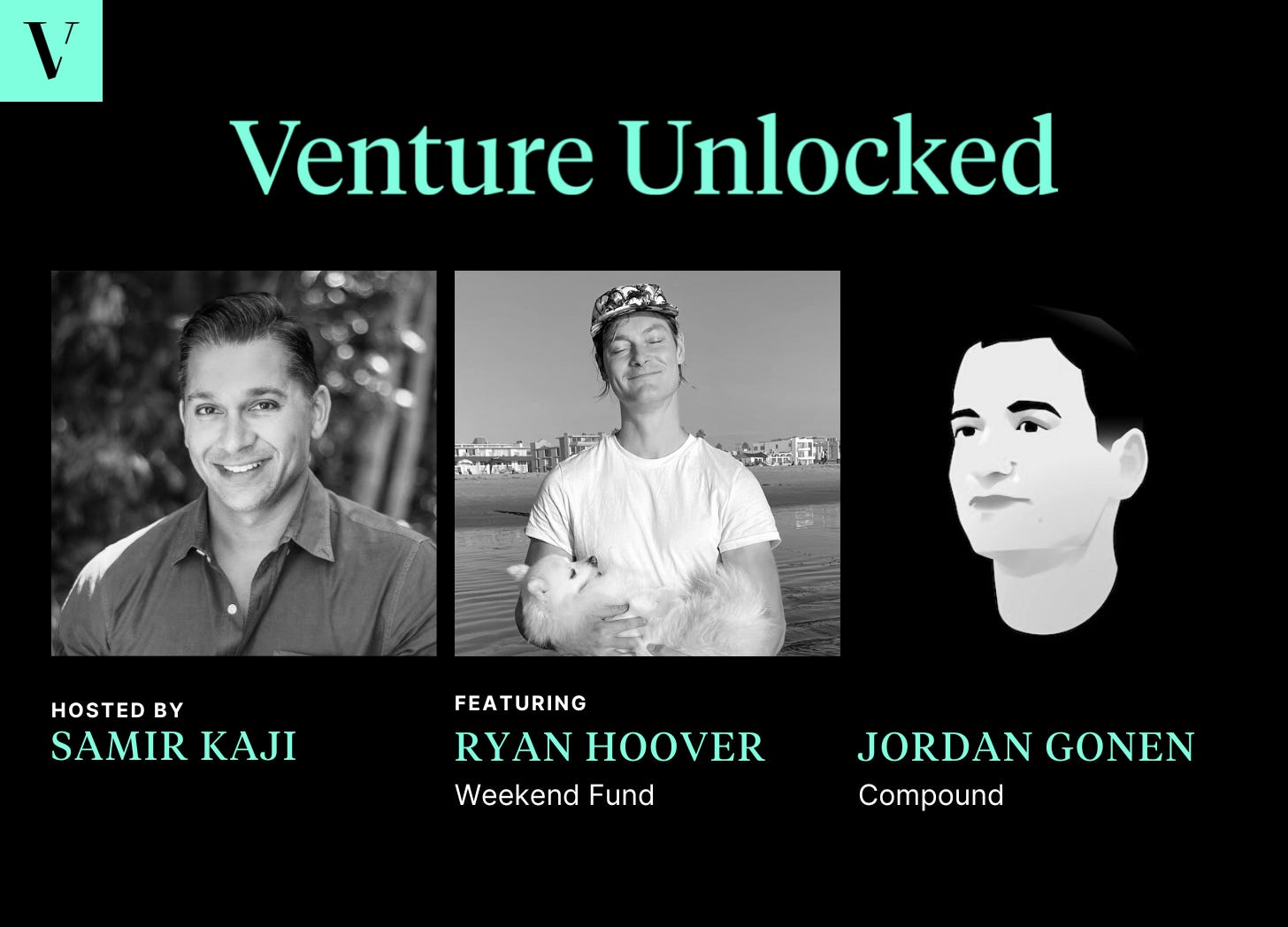
Ryan Hoover of Weekend Fund and Jordan Gonen of Compound on the rise of private and retail investors into venture capital and alternatives
Follow me @samirkaji for my thoughts on the venture market, with a focus on the continued evolution of the VC landscape.This week we are re-joined by friend of the pod Ryan Hoover who is the Managing Partner of Weekend Fund and Jordan Gonen, Co-Founder and CEO of Compound, a fintech platform that provides wealth management and advisory services to founders and employees of startups. This was a special episode covering the growing intersection of the private wealth sector and venture capital investing, and what trends we are all seeing. We hope you enjoy my conversation with Ryan and Jordan.Frank, Rimerman + Co.’s history is closely intertwined with that of Silicon Valley. With humble beginnings similar to so many start-ups, Frank, Rimerman was formed with a desire to serve the entrepreneurial and venture communities of the Valley and the determination to think outside-the-box.When it comes to venture funds, we work with almost 500 VC groups from over 20 states across the USA. We have worked with over 400 fund groups during their first year of operations, making us one of the leading providers in the country to emerging managers.No one wants to be bored at work. That’s why we chose to work with some of the most innovative and creative people – people who are changing the world around us every day. Their excitement fuels our passion and determination to grow and serve this special community.Frank, Rimerman + Co, Passion Works Here.www.frankrimerman.comAbout Ryan Hoover:Ryan is the founder of Weekend Fund. He started his professional career as a product manager in the gaming industry. His fascination with technology and behavioral psychology led him to help write Hooked: How to Build Habit-Forming Products.In 2013 he founded Product Hunt, inspired by his curiosity and a desire to support early-stage makers and founders. The company raised capital from Y Combinator, Andreessen Horowitz, and others before joining AngelList. About Jordan Gonen:Jordan Gonen is the Co-Founder and CEO of Compound. Prior to that, he was at Scaphold (YC W17) and Pluot (YC W16). He also had stints at Inside, RealtyShares, Cultivation Capital, and more.Jordan’s writing has been featured in Forbes, Fortune Magazine, Startup Grind, Entrepreneur, Business Insider, Inc., Time, Mashable, Elite Daily, the Huffington Post, and others. Jordan studied at Washington University in St. Louis.In this episode we discuss:(02:20) Why Jordan started Compound(05:06) Why High Net-Worth Individuals seek out Alternative Investments(08:31) Motivations for becoming an LP(12:08) Advice for those new to Venture Investing as an LP(16:46) How you should evaluate a fund manager(23:04) Building deal flow as an emerging manager(27:22) Red flags when evaluating an investment(32:31) What the markets will hold in 2023I’d love to know what you took away from this conversation with Ryan and Jordan. Follow me @SamirKaji and give me your insights and questions with the hashtag #ventureunlocked. If you’d like to be considered as a guest or have someone you’d like to hear from (GP or LP), drop me a direct message on Twitter.Podcast Production support provided by Agent Bee Agency This is a public episode. If you would like to discuss this with other subscribers or get access to bonus episodes, visit ventureunlocked.substack.com
Wed, February 22, 2023
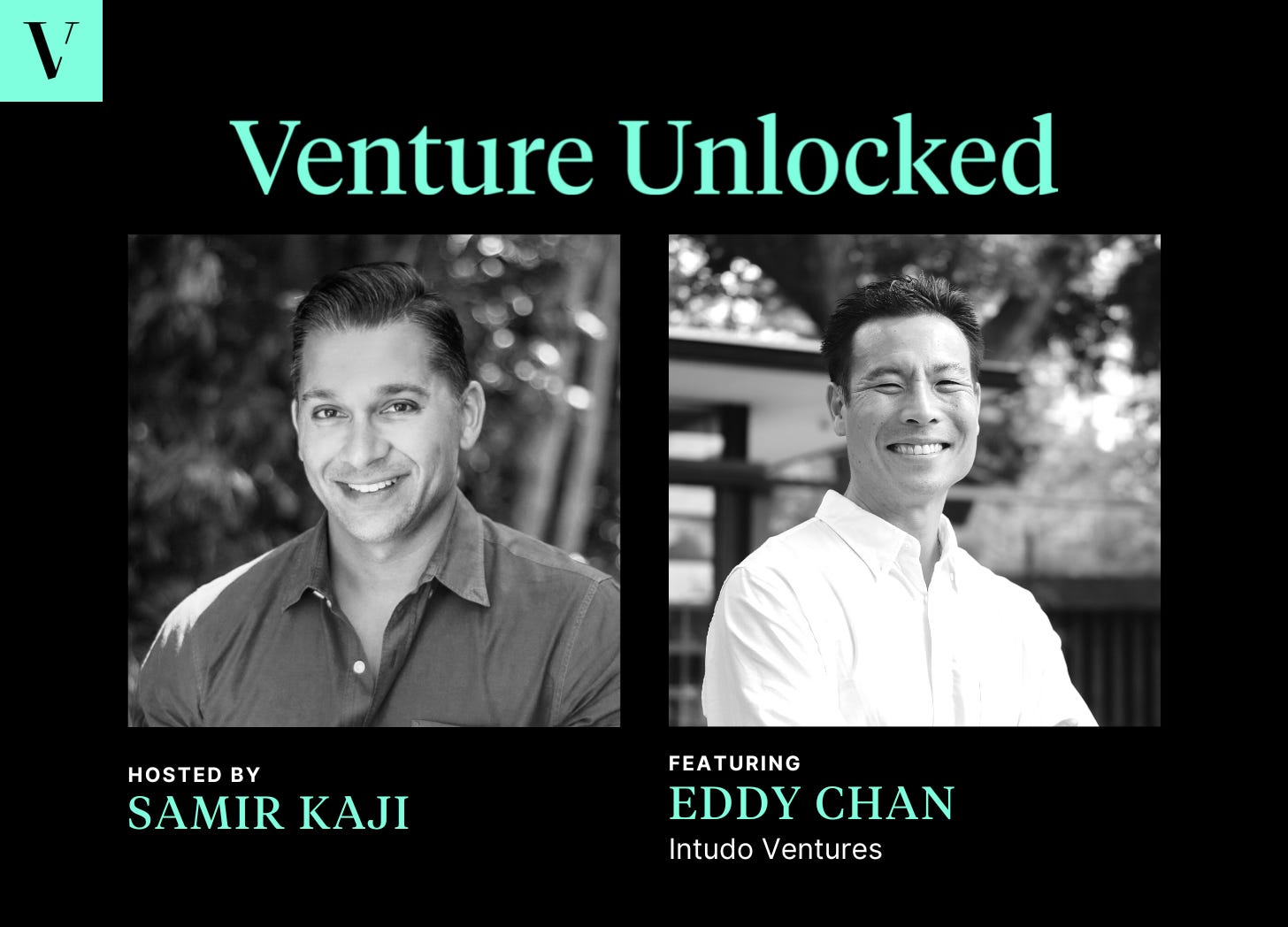
Eddy Chan of Intudo Ventures on building a hyper-local venture strategy for Indonesia
Follow me @samirkaji for my thoughts on the venture market, with a focus on the continued evolution of the VC landscape.This week we are joined by Eddy Chan, founding partner of Intudo Ventures, which employs a hyper-local strategy by backing entrepreneurs in Indonesia. With over $230M in AUM, the firm has become one of the largest Indonesia-only based firms.Eddy and I had a fun conversation on the reasons why hyper-local strategies can work, what these regions need to scale, and some of the interesting ways they leverage their LP base to help with portfolio building. Frank, Rimerman + Co.’s history is closely intertwined with that of Silicon Valley. With humble beginnings similar to so many start-ups, Frank, Rimerman was formed with a desire to serve the entrepreneurial and venture communities of the Valley and the determination to think outside-the-box.When it comes to venture funds, we work with almost 500 VC groups from over 20 states across the USA. We have worked with over 400 fund groups during their first year of operations, making us one of the leading providers in the country to emerging managers.No one wants to be bored at work. That’s why we chose to work with some of the most innovative and creative people – people who are changing the world around us every day. Their excitement fuels our passion and determination to grow and serve this special community.Frank, Rimerman + Co, Passion Works Here.www.frankrimerman.comAbout Eddy Chan:Eddy Chan is a founding partner of “Indonesia-only” Independent venture capital firm Intudo Ventures with over US$230 million in committed capital, that acts as the Indonesia beachhead strategy for dozens of leading institutions, funds, and family offices from around the world. Intudo portfolio companies include Xendit, Pintu, Pinhome, Halodoc, TaniHub, Kargo, PasarPolis, BeliMobilGue (acquired by OLX), Nalagenetics, Populix, and more.Prior to co-founding Intudo Ventures, Eddy worked on venture investments in startups since the late 1990s, including PayPal, Palantir, and Affirm, founded and operated venture-backed technology companies with operations in Silicon Valley and Asia, practiced corporate/M&A law and worked as an investment banker.Eddy holds a J.D. from Georgetown University and a B.S. in Business Administration from UC Berkeley.In this episode we discuss:(01:32) Why Eddy founded Intudo in 2016(05:47) The reasons Eddy thought Indonesia was ready for a hyper-local fund(09:52) Capital availability for companies that are in Indonesia(16:01) Navigating hyper-local challenges of getting companies far enough so that they can attract that Series A and how its different from Silicon Valley(22:55) How the first fundraise went and why LPs are more comfortable now(28:41) Why independence is a core value to Eddy and why no single LP can be more than 10% of the entire fund(31:16) How Intudo’s portfolio becomes a beachhead into Indonesia and the larger Asian market for its LPs(37:01) Intudo’s concentrated portfolio construction(41:09) Balancing due diligence and the speed of the marketI’d love to know what you took away from this conversation with Eddy. Follow me @SamirKaji and give me your insights and questions with the hashtag #ventureunlocked. If you’d like to be considered as a guest or have someone you’d like to hear from (GP or LP), drop me a direct message on Twitter.Podcast Production support provided by Agent Bee Agency This is a public episode. If you would like to discuss this with other subscribers or get access to bonus episodes, visit ventureunlocked.substack.com
Thu, February 2, 2023

Better Tomorrow Ventures, Jake and Sheel on Investing in FinTech, fund construction, and fundraising lessons
Follow me @samirkaji for my thoughts on the venture market, with a focus on the continued evolution of the VC landscape.We are officially 100 episodes in! For our 100th episode, we are joined by the founders of Better Tomorrow Ventures, also known as BTV, Jake Gibson and Sheel Mohnot. BTV is based in San Francisco and was founded in 2019. BTV focuses on early investing in FinTech companies, and has $300M+ in AUM. Jake and Sheel initially met at 500 startups, where Sheel worked. They are both seasoned fintech founders and angel investors: Sheel built and sold two fintech companies before starting the 500 Fintech accelerator, and Jake co-founded NerdWallet (now publicly traded).About Jake Gibson:Jake Gibson is a founding partner of Better Tomorrow Ventures. He has been involved in FinTech for over a decade — he started his journey as one of the co-founders of NerdWallet before becoming an angel investor. Today, he is a Founding Partner at Better Tomorrow Ventures (BTV). Prior to NerdWallet, Jake studied math and quantitative finance at MIT and traded interest rate derivatives at JPMorgan.About Sheel Mohnot:Sheel Mohnot is a founding partner of Better Tomorrow Ventures. Before BTV, Sheel was a Partner at 500 Startups, running the 500 FinTech Fund and the FinTech track within the San Francisco Accelerator program. His recent startup experience includes 2 successful FinTech exits – a payments company and a high-stakes auction company. He also created and hosted a podcast called The Pitch.He formerly worked as a financial services consultant at BCG and did Microfinance work at the non-profit Kiva. Sheel holds an MBA from the University of Michigan and a BS from Carnegie Mellon. In this episode we discuss:(02:24) BTV’s origin story (06:27) Handling their first raise at the beginning of the pandemic(11:28) How their fund construction remained the same despite market conditions(17:27) Surprises during their first fundraise(19:29) How Sheel and Jake view fund construction and ownership targets(24:18) The shift in the market from rewarding Beta to rewarding Alpha(27:55) How founders are reacting to market conditions(29:28) What they are seeing in the Series A markets today(32:19) How VC’s dry powder will actually get deployed(34:53) Making sense of the market segments in 2023(37:53) Why FinTech is still in the early-stages even though it has been heavily invested in(42:15) Non-obvious things that it takes to run a successful firm(45:17) Things they would have done differently at the start of their firmI’d love to know what you took away from this conversation with Jake and Sheel. Follow me @SamirKaji and give me your insights and questions with the hashtag #ventureunlocked. If you’d like to be considered as a guest or have someone you’d like to hear from (GP or LP), drop me a direct message on Twitter.Podcast Production support provided by Agent Bee Agency This is a public episode. If you would like to discuss this with other subscribers or get access to bonus episodes, visit ventureunlocked.substack.com
Wed, January 11, 2023
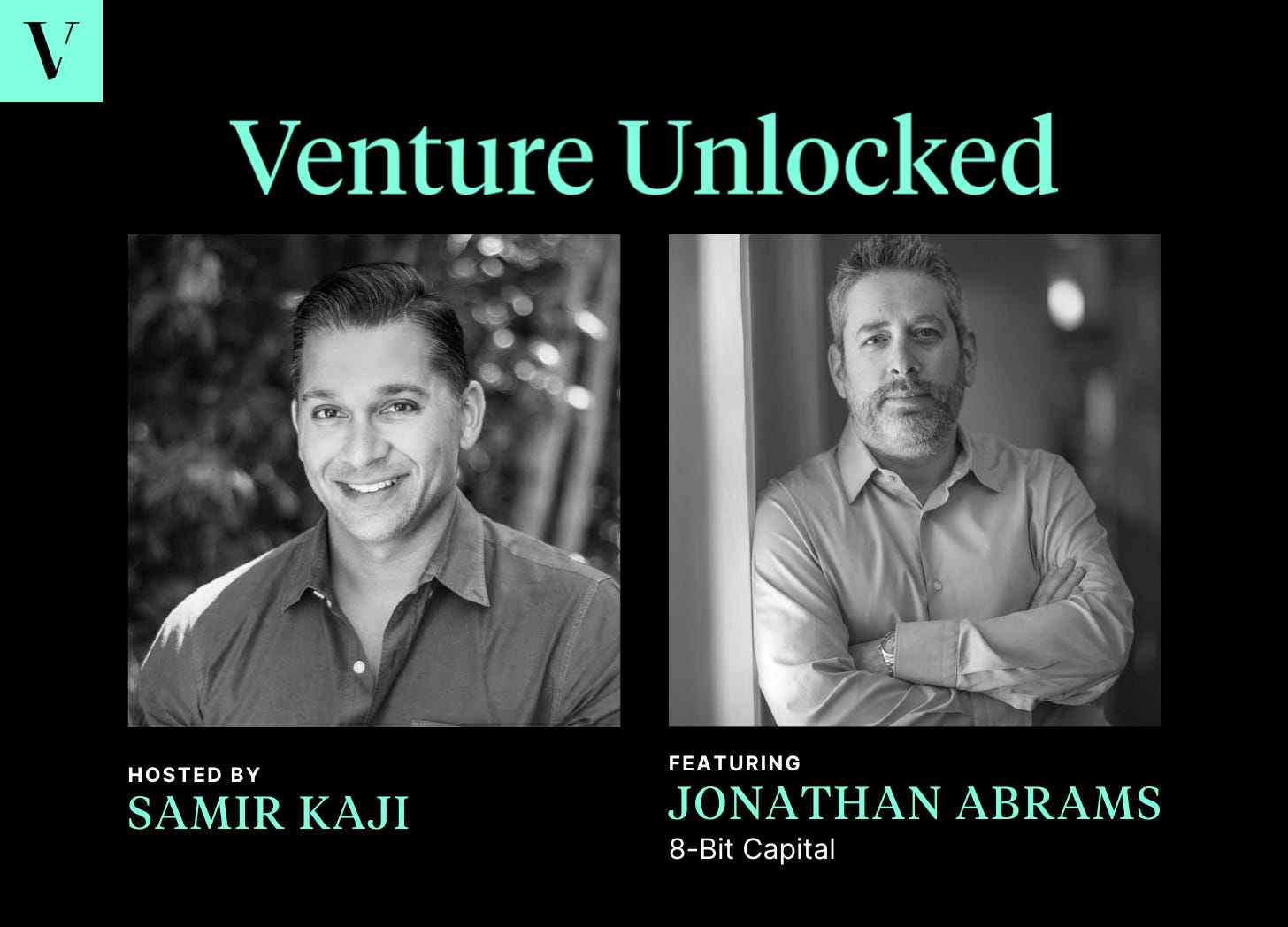
Jonathan Abrams, 8-Bit Capital: Learnings from founding and running Friendster, Defining "Founder Friendly", going from Angel to full-time VC
Follow me @samirkaji for my thoughts on the venture market, with a focus on the continued evolution of the VC landscape.We are joined by Jonathan Abrams, Co-Founder and General Partner at 8-Bit Capital. Jonathan previously was an angel investor and entrepreneur founding both Nuzzel and Friendster, the latter of which he helped grow to over 100MM users and where he met his current partner at 8-Bit, Kent Lindstrom. Jonathan also co-founded Founders Den with Zack Bogue of DCVC in 2011, which quickly became one of San Francisco’s earliest and most popular startup work and event spaces.We think you’ll really enjoy Jonathan’s story, and how he thinks about all aspects of seed-stage investing.A word from our sponsor:Tactyc is the first software solution for venture capital portfolio forecasting and planning. The platform is rapidly increasing efficiency and data-driven decision-making for GP’s and works with over 150 funds globally.Tactyc makes it easy for managers to build (and maintain) their portfolio models without dealing with complicated spreadsheets. It enables portfolio construction in minutes and for managers to share their intended fund strategy with potential investors. Post-launch, Tactyc also offers advanced analytics for GPs to optimize reserves, analyze probabilistic outcomes for their investments and extract insights for future capital deployment.Check them out at tactyc.io.About Jonathan Abrams:Jonathan is a co-founder and General Partner of 8-Bit Capital, an early-stage investing firm. He is also a co-founder and Managing Partner of Founders Den, San Francisco’s favorite workspace and community for startups and investors.Previously Jonathan was the founder of the professional news discovery service Nuzzel and the pioneering social networking service Friendster, and a software engineer at Netscape and Nortel. Jonathan is an investor in over 50 startups, including AngelList, ClearTax, CoinList, Docker, Front, HelloSign, Instacart, Mixmax, Pachyderm, Republic, SafeGraph, Sense, Shortcut, Slideshare, Stream, and Zeplin. Jonathan received an Honors B.Sc. in Computer Science from McMaster University in Canada.In this episode we discuss:01:57 Jonathan’s journey to creating 8-Bit Capital with Kent04:08 The opportunity they saw when founding 8-Bit06:07 How his experiences at Nuzzel and Friendster shaped his view as an investor08:20 What being founder friendly truly means11:37 Shifting from an active angel investor to a fund manager14:41 The hardest lessons leveling up from an angel investor18:14 Dealing with the deal flow noise as a team of two21:20 How to deal with conscious and unconscious bias when advising founders23:28 Jonathan and Kent’s decision-making process25:02 Thoughts on scaling 8-Bit28:11 Competing against larger, later-stage funds getting into seed-stage investing31:23 Deciding on follow-on investing33:35 How they came to decide on 50-50 fund construction for follow-on35:41 Keeping and increasing their pro-rata in competitive later rounds38:19 Biggest lessons from Friendster39:49 The advice he would give himself at the start of 8-BitI’d love to know what you took away from this conversation with Jonathan. Follow me @SamirKaji and give me your insights and questions with the hashtag #ventureunlocked. If you’d like to be considered as a guest or have someone you’d like to hear from (GP or LP), drop me a direct message on Twitter.Podcast Production support provided by Agent Bee Agency This is a public episode. If you would like to discuss this with other subscribers or get access to bonus episodes, visit ventureunlocked.substack.com
Wed, December 21, 2022
🔭
v:
Made with ☕️ in SF/SD.
© 2023 Spyglass Search, Inc.
